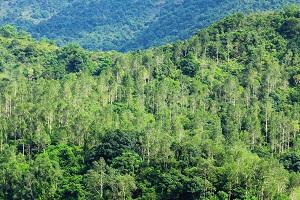The impacts of climate change on forests will be profound. Yet global emissions reduction models rely on the ability for forests to both sequester carbon and scale up production of innovative new products that can replace emissions-intensive materials used in construction, textiles and energy generation.
The UNECE Forest Sector Outlook Study 2020 – 2040, launched today at the joint session of the UN Economic Commission for Europe’s (UNECE) Committee on Forests and the Forest Industry (COFFI) and the United Nation’s Food and Agriculture Organization (FAO) European Forestry Commission (EFC), presents rigorous scenario modelling-based policy considerations for the forest industry to support sustainable supply-chains and contribute to global climate change mitigation and adaptation efforts.
Announcements made at COP26 point at decisive progress on sustainable forest management and conservation. 130 leaders, representing 90% of the world’s forests, committed to halting and reversing forest loss and land degradation by 2030. Achieving this goal is however a complex task. Strategies to combine sustainable mitigation and adaptation efforts in line with the UN Decade of Ecosystem Restoration and the Sustainable Development Goals must also consider the increased risk of climate change events such as insect outbreaks, storms, droughts and forest fires.
Forests in the UNECE region account for 47% of global forest carbon stock and provide 60% of the world’s industrial roundwood, which can be used to produce sustainable forest-based products to support the global transition to a green economy. Maintaining the delicate balance between conservation and production within the context of a changing climate requires a holistic policy framework.
The study finds that increased production of sustainable wood-based products to substitute emissions-intensive materials in textile manufacturing and wood construction is projected to be nearly carbon neutral, as changes in the forest carbon sink counterbalance avoided emissions from other sectors. Yet, for the region’s forests to sustain multiple functions to sequester carbon and produce substitute products, complex trade-offs must be made.
The study provides transparent, objective analysis to support UNECE member states to navigate these trade-offs while maximizing the potential for innovation and recognizing the central role that forests play in the global carbon equation.
Ms. Olga Algayerova, Executive Secretary of UNECE, emphasized the important timing of the study: “demand for wood and other forest products and services, including biodiversity conservation and carbon sequestration, is rising and changing. As a result, the choices facing forest managers and policymakers are becoming more complex. The Forest Sector Outlook Study highlights the complex issues that need careful consideration to ensure that sustainable forest management practices continue in the UNECE region in the decades to come."
Mr. Vladimir Rakhmanin, FAO Assistant Director-General and Regional Representative for Europe and Central Asia agreed, saying that, ”the findings of the Outlook Study will help to reinforce efforts for more sustainable production and trade of forest products, which is vital to building on progress made towards the 2030 Agenda for Sustainable Development, achieving the Paris Agreement targets and the Sustainable Development Goals.”
Note to editors
The study is the first to cover the entire UNECE region. It applies detailed scenario modelling to address six key policy questions that focus on the structure of the global forest market and the anticipated impacts of climate change, which were developed in close consultation with industry stakeholders. It can be found at: https://unece.org/info/Forests/pub/362308


